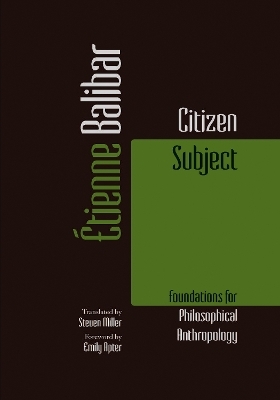
Citizen Subject
Fordham University Press (Verlag)
978-0-8232-7361-4 (ISBN)
What can the universals of political philosophy offer to those who experience "the living paradox of an inegalitarian construction of egalitarian citizenship"? Citizen Subject is the summation of Étienne Balibar’s career-long project to think the necessary and necessarily antagonistic relation between the categories of citizen and subject. In this magnum opus, the question of modernity is framed anew with special attention to the self-enunciation of the subject (in Descartes, Locke, Rousseau, and Derrida), the constitution of the community as “we” (in Hegel, Marx, and Tolstoy), and the aporia of the judgment of self and others (in Foucualt, Freud, Kelsen, and Blanchot).
After the “humanist controversy” that preoccupied twentieth-century philosophy, Citizen Subject proposes foundations for philosophical anthropology today, in terms of two contrary movements: the becoming-citizen of the subject and the becoming-subject of the citizen. The citizen-subject who is constituted in the claim to a “right to have rights” (Arendt) cannot exist without an underside that contests and defies it. He—or she, because Balibar is concerned throughout this volume with questions of sexual difference—figures not only the social relation but also the discontent or the uneasiness at the heart of this relation. The human can be instituted only if it betrays itself by upholding “anthropological differences” that impose normality and identity as conditions of belonging to the community.
The violence of “civil” bourgeois universality, Balibar argues, is greater (and less legitimate, therefore less stable) than that of theological or cosmological universality. Right is thus founded on insubordination, and emancipation derives its force from otherness.
Ultimately, Citizen Subject offers a revolutionary rewriting of the dialectic of universality and differences in the bourgeois epoch, revealing in the relationship between the common and the universal a political gap at the heart of the universal itself.
Étienne Balibar is Professor Emeritus of Moral and Political Philosophy at the Université de Paris X Nanterre; Professor Emeritus of Humanities at the University of California, Irvine; and Anniversary Chair in Modern European Philosophy at Kingston University, London. His research in the fields of political, moral, and Marxist philosophy focuses on emancipation, citizenship, and on what he terms “equaliberty.” The breadth of his thought can be gauged from his published works, from Reading Capital, released in 1965 and coauthored with his mentor Louis Althusser, to the more recent We, the People of Europe? Reflections on Transnational Citizenship (2003), Equaliberty (2014), Violence and Civility: On the Limits of Political Philosophy (2015), Citizen Subject: Foundations for Philosophical Anthropology (2017), and Secularism and Cosmopolitanism (2018). Steven Miller is Associate Professor of English and Director of the Center for Psychoanalysis and Culture at the University at Buffalo, SUNY. He is author of War After Death: On Violence and Its Limits and translator of books by Catherine Malabou, Étienne Balibar, and Anne Dufourmantelle. Emily Apter is Julius Silver Professor of French Literature, Thought and Culture and Comparative Literature, and Chair of French Literature, Thought, and Culture at New York University. Her books include Unexceptional Politics: On Obstruction, Impasse, and the Impolitic (Verso, 2018); Against World Literature: On the Politics of Untranslatability (2013); Dictionary of Untranslatables: A Philosophical Lexicon (coedited with Barbara Cassin, Jacques Lezra, and Michael Wood) (2014); and The Translation Zone: A New Comparative Literature (2006). Her current project, What Is Just Translation? takes up questions of translation and justice across media. Her essays have appeared in Public Culture, diacritics, October, PMLA, Comparative Literature, Art Journal, Third Text, Paragraph, boundary 2, Artforum, and Critical Inquiry. In 2019 she was the Daimler Fellow at the American Academy in Berlin. In 2017–18 she served as President of the American Comparative Literature Association. In fall 2014 she was a Humanities Council Fellow at Princeton University, and in 2003–4 she was a Guggenheim Fellowship recipient. She edits the Translation/Transnation book series at Princeton University Press.
Foreword-After the Quarrel INTRODUCTION Citizen Subject Response to a Question from Jean-Luc Nancy: "Who Comes After the Subject?" ANNEX: Subjectus/subjectum PART ONE "Our True Self Is Not Entirely Within Us" 1. "Ego sum, ego existo": Descartes on the Verge of Heresy 2. "My Self," "My Own": Variations on Locke 3. Aimances in Rousseau: Julie or The New Heloise as a Treatise on the Passions 4. From Sense Certainty to the Law of Genre: Hegel, Benveniste, Derrida PART TWO Being(s) in Common 5. Ich, das Wir, und Wir, das Ich ist: Spirit's Dictum 6. The Messianic Moment in Marx 7. Zur Sache Selbst: The Common and the Universal in Hegel's Phenomenology of Spirit 8. Men, Armies, Peoples: Tolstoy and the Subject of War 9. The Social Contract Among Commodities: Marx and the Subject of Exchange PART THREE The Right to Transgression 10. Judging Self and Others (On the Political Theory of Reflexive Individualism) 11. Private Crime, Public Madness 12. The Invention of the Superego: Freud and Kelsen 1922 13. Blanchot's Insubordination (On the Writing of the Manifesto of the 121) CONCLUSION The Uneasiness of the Subject Bourgeois Universality and Anthropological Differences
| Erscheinungsdatum | 24.11.2016 |
|---|---|
| Reihe/Serie | Commonalities |
| Übersetzer | Steven Miller |
| Vorwort | Emily Apter |
| Verlagsort | New York |
| Sprache | englisch |
| Maße | 178 x 254 mm |
| Themenwelt | Geisteswissenschaften ► Philosophie |
| Geisteswissenschaften ► Religion / Theologie | |
| Sozialwissenschaften ► Ethnologie | |
| Sozialwissenschaften ► Politik / Verwaltung ► Politische Theorie | |
| Sozialwissenschaften ► Soziologie | |
| ISBN-10 | 0-8232-7361-X / 082327361X |
| ISBN-13 | 978-0-8232-7361-4 / 9780823273614 |
| Zustand | Neuware |
| Haben Sie eine Frage zum Produkt? |
aus dem Bereich


